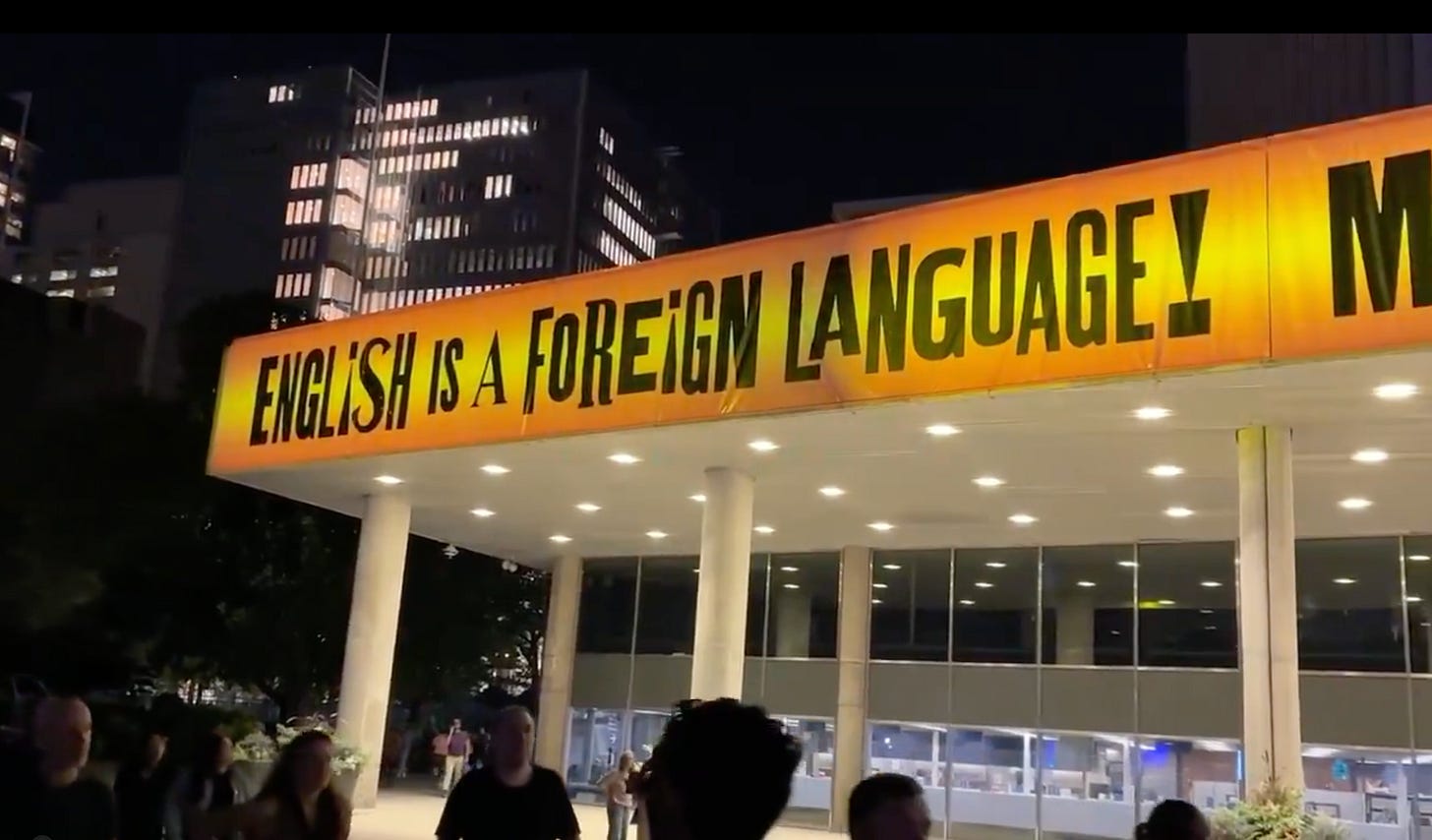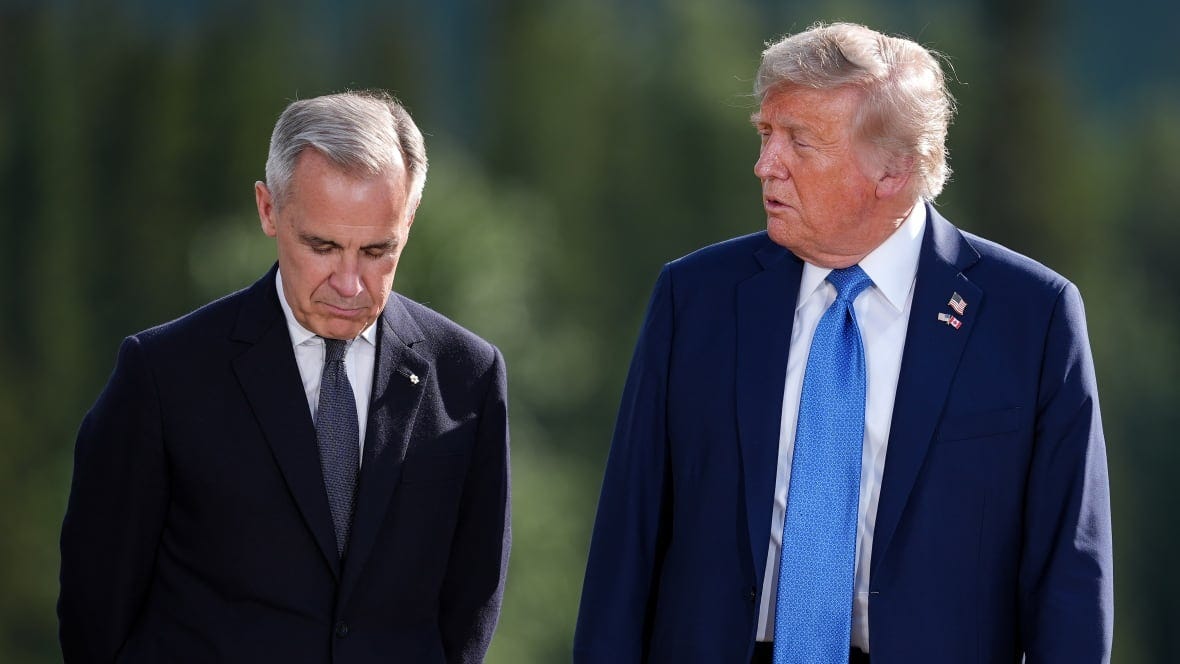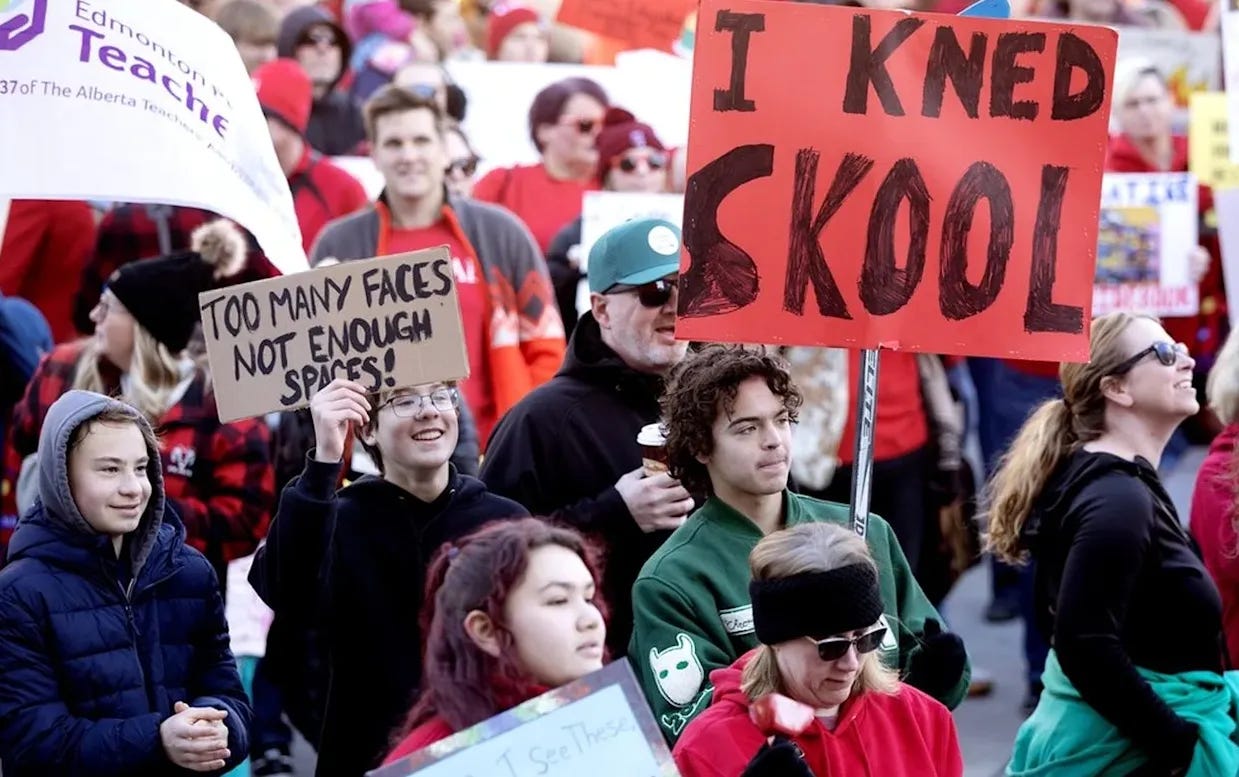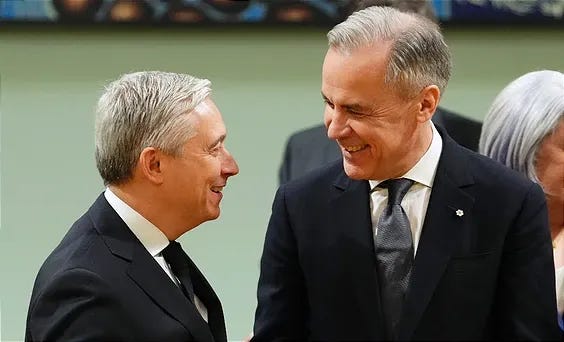Good morning, it’s Tuesday, October 7th. In today’s news, ‘decolonization’ has been used as a smoke screen for ‘multicultural’ colonization, Canada cannot rebuild without a pipeline, Carney heads to Washington with empty hands and lowered expectations, Israel deports Greta Thunberg, and much more.
First time reading the daily blend? Sign up here.
The Colonization of Canada
If you wanted to colonize a country in the 21st century, you wouldn’t send armies—you’d use ideology, demographics, and dependency. Canada is living proof.
Start with cultural subversion. At Toronto City Hall, publicly funded slogans like “English is a foreign language” and “Love Revolution” were projected onto the building during Nuit Blanche. This wasn’t random art—it was a declaration that the nation’s founding culture is now considered foreign, and that revolution is the new moral order. The very institutions built to preserve Canadian identity now undermine it.
For years, neo-Marxist activists have shouted about “decolonization,” claiming to dismantle oppressive power structures. But everything they accuse others of is projection. Their real project has been to re-colonize Canada under a new ideological empire—one that replaces civic identity with intersectional hierarchy and national sovereignty with transnational governance. “Decolonization,” in practice, has been the moral justification for modern colonialism—the construction of Justin Trudeau’s “post-national” state, a vision he proudly announced to The New York Times nearly a decade ago.
Meanwhile, demographic and fiscal re-engineering continues at full throttle. Canada now has five of the ten most foreign-born cities on Earth, and according to Ottawa’s own 2024 tax report, recent immigrants receive 205% more in Canada Child Benefits than people born here. The government even quantifies how much wealth is redistributed from one racial group to another, in the name of “equity.”
But the deeper issue isn’t just redistribution—it’s economic extraction. A growing share of newcomers arrive through asylum and temporary worker programs riddled with fraud, loopholes, and organized exploitation. Many send their earnings abroad instead of investing locally, draining untold amounts of capital from the domestic economy each year. What was once mutualism—where newcomers joined the nation and contributed to its future—has turned into opportunism, where the system rewards short-term gain over long-term loyalty. When the state subsidizes dependency while punishing productivity, it ceases to function as an economy and starts to function as a transfer mechanism.
Behind the ideological veil lies criminal and geopolitical capture. Our ports, banks, and police have been infiltrated by transnational networks that move drugs, weapons, and money with impunity. Cars stolen in Toronto fund Hezbollah. Fentanyl from China floods our cities. The RCMP looks the other way. The state that can’t protect its citizens somehow always finds time to police their speech.
And caught between it all are ordinary Canadians—squeezed from above by a government pursuing hostile post-national policies, and from below by a revolutionary class that labels dissent as “fascism” and justifies violence in the name of progress.
As Eric Weinstein warned, “You are looking at revolutionaries. But because you can’t parse that a revolutionary grabs lattes after Pilates with you, administers your mom’s anesthesia, or teaches 2nd graders, you can’t parse why they giggle at murder.”
It’s time Canadians did.
You Can’t Rebuild Canada Without a Pipeline
Alberta Premier Danielle Smith is taking decisive action to unlock Canada’s vast energy potential at a time when the country urgently needs economic leadership. With Alberta’s oil reserves valued at over $9 trillion, the province’s resources represent the single most powerful economic engine Canada has left—especially as Liberal policies continue to stifle growth.
If projects like the Northern Gateway, Energy East, and Keystone XL had been completed, Canada’s GDP would be $55 billion stronger today. The economic opportunity of a new bitumen pipeline to the northwest BC coast dwarfs other nation-building projects, promising hundreds of billions in government revenue that could fund healthcare, education, and national security, while generating jobs and prosperity for Canadians and Indigenous communities.
Public support for new pipelines is strong—recent polling shows three-quarters of Canadians favor construction—and global demand for Canadian oil continues to rise, with markets in Asia and Europe eager for reliable energy. Yet federal barriers like Bill C-69, the oil and gas production cap, and tanker bans make private investment nearly impossible. Even worse, the Liberal federal government and the BC provincial government continue to push back against this critical infrastructure. Their opposition isn’t just political obstruction—it’s economic sabotage, blocking billions in revenue, tens of thousands of jobs, and a once-in-a-generation opportunity for Canada.
By announcing that Alberta will be the proponent of a new pipeline, investing $14 million in technical and application design, Smith is positioning the province to take control of its economic destiny. Indigenous communities are being engaged as partners and co-owners, ensuring wealth and opportunity flow to First Nations for generations.
This is not just an economic issue—it’s a moral and national imperative. Canada cannot afford to let billions in investment and future revenue slip away because of ideological roadblocks. Danielle Smith’s pipeline initiative represents one of the only viable paths to unlock transformative wealth, create jobs, and secure Canada’s place as a global energy leader—if only our federal leaders could put partisanship aside and do what’s right for Canadians.
Carney Heads to Washington With Empty Hands and Lowered Expectations
Prime Minister Mark Carney’s trip to Washington this week was framed as a diplomatic formality, not a breakthrough. A senior official told reporters there would be no “white smoke” — a phrase Carney himself has used to temper expectations — and indeed, Canadians have little reason to expect anything concrete to emerge from his third meeting with President Trump.
Despite campaign promises to “negotiate a win,” Carney arrives in the U.S. capital facing steeper tariffs than when he took office. Steel and aluminum remain hit with a 50% levy under Section 232 of the U.S. Trade Expansion Act, while softwood lumber just saw another 10% slapped on. Auto parts and copper continue to face restrictions, and even sectors covered under the Canada–U.S.–Mexico Agreement (CUSMA) are anxious about what comes next as the 2026 review approaches.
The reality is that Canada’s bargaining power has diminished. The prime minister’s delegation — which includes Intergovernmental Affairs Minister Dominic LeBlanc, Industry Minister Mélanie Joly, and Foreign Affairs Minister Anita Anand — is arriving not to negotiate from strength, but to plead for reprieve. Carney’s government insists these are “honest conversations” meant to “maintain relationships,” yet that language signals weakness more than strategy.
Carney’s troubles are as much domestic as they are international. Opposition Leader Pierre Poilievre has seized the moment, reminding Canadians that Carney’s campaign rhetoric of “elbows up” diplomacy has delivered little more than higher tariffs and costly concessions. Ottawa backed down on dollar-for-dollar countermeasures and the Digital Services Tax, winning nothing tangible in return. The prime minister’s promise to “get tough” with Washington now looks like little more than posturing.
The deeper problem is one of credibility. Canada has spent years outsourcing its economic leverage to Washington while pretending it still holds a meaningful seat at the table. Instead of developing independent trade routes, energy infrastructure, or domestic manufacturing strength, Ottawa has grown comfortable in dependency. When the United States acts in its own interest — as it always will — Canada finds itself flat-footed, forced to beg for exemptions instead of demanding respect.
Carney’s Washington visit, then, is less about negotiation than survival. Behind the smiles and sound bites lies an uncomfortable truth: Canada is no longer setting the terms of its economic future — it’s reacting to them. Until that changes, Canadians shouldn’t expect “white smoke,” only more drift. Source.
Israel Deports Greta Thunberg, Along With 170 Other Gaza Flotilla Activists
Israel has deported 171 passengers from the Global Sumud Flotilla—including Swedish climate activist Greta Thunberg—to Greece and Slovakia, citing security concerns and ties between some organizers and Hamas. The flotilla, carrying European activists, lawmakers, and humanitarian workers—even a few Canadians—claimed it was a “peaceful mission” to deliver aid to Gaza, but Israel intercepted the vessels to prevent them from breaching the naval blockade.
The Israeli Foreign Ministry rejected allegations of mistreatment, saying all legal rights were upheld and that claims of abuse were “pre-planned fake news.” Deportations continued in recent days, with previous groups sent to Turkey and Spain. These actions come as Israeli, Hamas, US, and Qatari officials meet in Egypt to discuss a proposed US peace plan for Gaza. More
Alberta Teachers Begin First Day of Province-Wide Strike
Alberta is experiencing its largest teacher strike in history, with 51,000 educators walking off the job over a contract dispute, affecting roughly 2,500 schools and more than 700,000 students. The Alberta Teachers’ Association (ATA) cites overcrowded classrooms, increased workloads, and inadequate support as key issues, framing the strike as a push for sustainable solutions for public education.
Premier Danielle Smith emphasized the province’s willingness to negotiate and criticized the union for not clearly communicating teachers’ priorities. The government’s rejected offer included a 12% salary increase over four years, hiring 3,000 teachers and 1,500 educational assistants, and a transition to a unified pay grid providing up to a 17% wage increase for most educators.
While online learning tools and curriculum kits are available to students during the strike, Smith called it a “lose-lose-lose situation,” noting that teachers, students, and parents all face challenges. Negotiations continue, but the union has not indicated when it will submit its next proposal. More
Senate Again Rejects Competing Bills to End Government Shutdown - The stalemate over how to end the government shutdown is stretching into another week without a clear resolution in sight. More
France Faces New Political Turmoil After Prime Minister Sébastien Lecornu Resigns Just Weeks Into Role - More
Putin Says Tomahawk Missile Supply to Ukraine Would Destroy US Relations - More
Snowstorm Traps Hundreds on Mount Everest - Some 350 hikers were rescued, and 200 remain stranded, as rescue efforts continued in China’s Tibet Autonomous Region. More
Chicago Mayor Signs Executive Order Creating ICE-Free Zone - However, the federal government “has primary authority over immigration matters,” meaning it can “override state and local laws that conflict with federal immigration policy.” More
Syria Chooses a Parliament of Revolutionaries - In the first elections since the Assad regime was ousted, there was no popular vote, and women and minorities won few seats. Still, many Syrians saw it as progress toward ending authoritarian rule. More
Ghislaine Maxwell’s Bid to Have Sex-Trafficking Conviction Reviewed by Supreme Court Rejected - More
Liberals Permanently Flip Budget Schedule After Eight Months Without a Plan
The federal government will now table its annual budget in the fall and separate capital spending from operating costs, breaking with the longstanding tradition of spring budgets. Finance Minister François-Philippe Champagne framed the change as a way to better align spending with construction seasons and provide more predictability for businesses and other governments.
Critics argue the shift is little more than an accounting distraction. Conservative MP Pat Kelly called it a tactic to divert attention from the government’s ongoing fiscal mismanagement, pointing out that the Liberals have yet to present a balanced budget and remain on track to only balance the operating budget by 2028–29. While the government promises full transparency, the sudden change after an eight-month budget delay underscores a pattern of partisanship and delays that leave Canadians in the dark about fiscal priorities. More
OpenAI Signs Multi-Billion Dollar Chip Supply Deal with AMD - Advanced Micro Devices’ share price surged 35 percent when markets opened on news of the agreement that would see the company deliver six gigawatts worth of chips to the ChatGPT maker. More
Americans to Spend Record $250 Billion Online This Holiday Season, Adobe Predicts - More
Magic Mushrooms Show Surprising Power to Ease Pain and Depression
Psilocybin, the active ingredient in certain “magic mushrooms,” shows promise in relieving both chronic pain and associated depression by calming brain circuits that link physical pain with emotional distress. Research from Penn Medicine found that a single dose eased pain and depression-like behaviors in mice for nearly two weeks by subtly modulating serotonin receptors in the brain’s prefrontal cortex, particularly the anterior cingulate cortex.
Unlike opioids, psilocybin targets the brain’s pain and mood hubs rather than the site of injury, offering a potential non-addictive alternative for managing chronic pain. Researchers believe these findings could also inform treatments for other conditions involving dysregulated brain circuits, such as PTSD and addiction, though further study is needed to determine optimal dosing, long-term effects, and applicability in humans. More
Saturn’s Moon Shows Major Signs of Life - Astronomers have found that Saturn’s moon, Enceladus, is spewing out copious amounts of complex organic molecules, suggesting it’s an even more promising place to look for extraterrestrial life than previously thought. More
Trump Announces UFC Event at White House for 250th US Anniversary and His 80th Birthday
President Donald Trump announced that a UFC mixed martial arts event will now be held on June 14, 2026, on the White House grounds to celebrate the 250th anniversary of the Declaration of Independence, coinciding with his 80th birthday. Trump highlighted the event while speaking to service members in Norfolk, Virginia, as part of broader year-long celebrations marking the US semiquincentennial.
UFC President Dana White confirmed that planning for the fight card will begin in February 2026, promising it will be the “greatest fight card ever assembled.” The celebrations will also include other professional and amateur sporting events, including a youth “Patriot Games” featuring top high school athletes from across the country. Trump, known as the “combatant in chief” in the MMA world, has continued attending UFC events since returning to the White House. More
Superstar Centre Connor McDavid Signs Two-Year, $25-Million Extension with the Edmonton Oilers - More
Thieves Stole 24,000 Bottles of Guy Fieri’s Tequila in a Highway Heist - More
Israel-Premier Tech Cycling Team to Rebrand in Wake of Recent Protests - The team also announced that Canadian-Israeli co-owner Sylvan Adams will step back from his day-to-day involvement and will no longer speak on behalf of the team. More
Michelin-Starred Restaurant Serves Yogurt Made With Red Fire Ants by Innovative Scientists
French TikToker Who Faked Syringe Injections on Random People on Paris Streets Sentenced to Six Months in Prison
Man Hospitalized After Eating 6.6 Pounds of Gummie Bears in Three Days



















First article: Watch out immigrants are stealing our money! You should be afraid.
Second article: Hurry, we gotta urgently sell our oil to China! You should be excited.